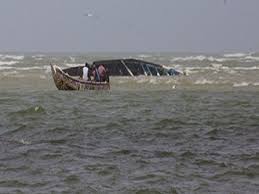A pirogue found on the high seas off Dakar with a large number of rotting corpses on board has been causing a stir since Monday.
The Mamelles beach in Ouakam, a coastal commune of Dakar, was unusually crowded that Monday, September 23. Rumors of a macabre discovery at sea had been circulating since the day before. A drifting pirogue with numerous bodies on board was discovered on the high seas by a fisherman who alerted the authorities.
According to several sources, the dead were trying to reach Spain. The initial thought was to go to Ouakam to look for bodies that might have washed up on the beach, or for the pirogue to be docked by rescue crews.
Local fishermen, however, insist that these initial reports be corrected.
“Some of your colleagues came here, I asked them to go to Yoff (a nearby locality) where the fisherman who discovered the pirogue filled with the bodies of illegal migrants lives,” recounts a man introduced as the president of the fishing wharf, still haunted by a tragic incident in July 2023, when a pirogue capsized off Ouakam, killing 17 people.
Local witnesses, though far removed from the main event, were no less concerned. Ibrahima Wade, an experienced beach lifeguard, confided that he immediately alerted the gendarmerie when he heard the news.
Wearing the jersey of Union Sportive de Ouakam, the local club that joined Senegal’s soccer elite last year, he explains that the macabre ship lies about 3,000 feet from the beach.
“There are many bodies and survivors on board. It’s crucial that the authorities intervene quickly,” he said, while media reports indicate that all those aboard the pirogue are dead and in a state of decomposition.
This was confirmed on Monday by the Directorate of Information and Public Relations of the Armed Forces (DIRPA) in a press release announcing the discovery the previous day of a “pirogue floating” with lifeless bodies some 70 kilometers off the coast of Dakar.
Thirty bodies already counted
The navy patrol boat “Cayor” was dispatched to the scene and towed the boat to the outer harbor of the port of Dakar, where the convoy arrived on Monday morning. Upon arrival, rescue and medical teams were confronted with a horrific scene. Only thirty bodies in an “advanced state of decomposition” could be “counted” on the spot.
The army stresses that investigations are underway to determine the exact origin of the pirogue and the circumstances of this tragedy, which is reminiscent of the perilous migratory route to Europe, often fatal for those who try to flee the misery of sub-Saharan Africa at the risk of their lives.
Wade gave investigators an initial clue that the pirogue may have come from the southern region of Casamance, a common departure point for illegal migrants heading to the Canary Islands. However, the last migrant pirogue shipwreck that plunged the country into mourning occurred in early September in Mbour, in the west of the country, when some forty bodies were recovered.
Wade urged the government to step up surveillance, particularly with lifeguards like himself who are used to frequenting the beach. He also suggests a crackdown on the networks of smugglers who often set up travel plans on the beaches.
A little further on, a group of young men sitting around a cup of tea seem overcome with emotion at the macabre news from their neighbourhood. Arkel, a local resident, testifies to the fear he felt when he heard the news.
“At midnight we were informed about the pirogue full of corpses. It’s really sad,” he says, adding that it’s not the first time such a tragedy has happened here.
He and his friends tried to search for the stranded bodies during the night, but to no avail. He appeals to the new authorities to stem the tide of illegal departures, which is reaching worrying proportions, especially among young people.
ODL/sf/te/lb/as/APA


